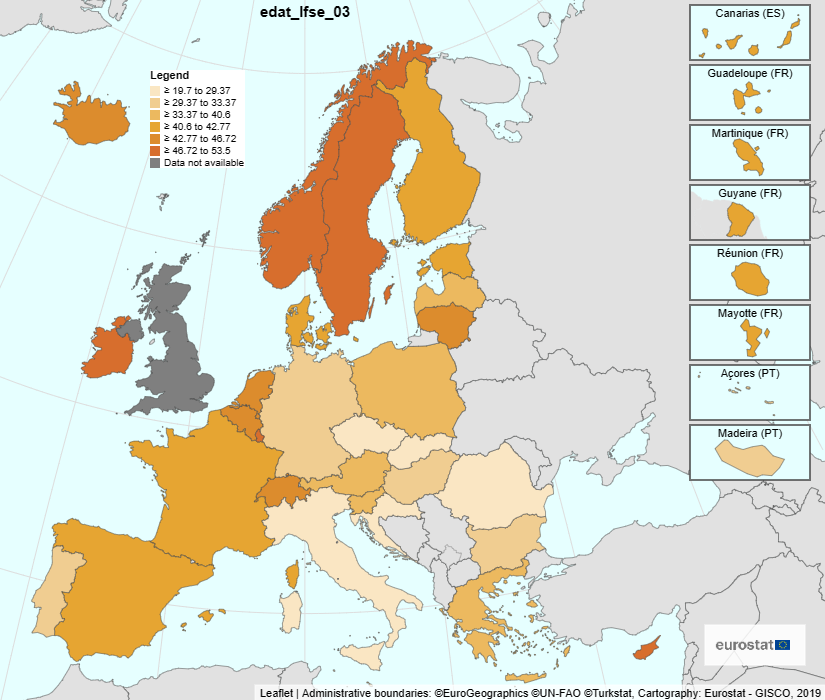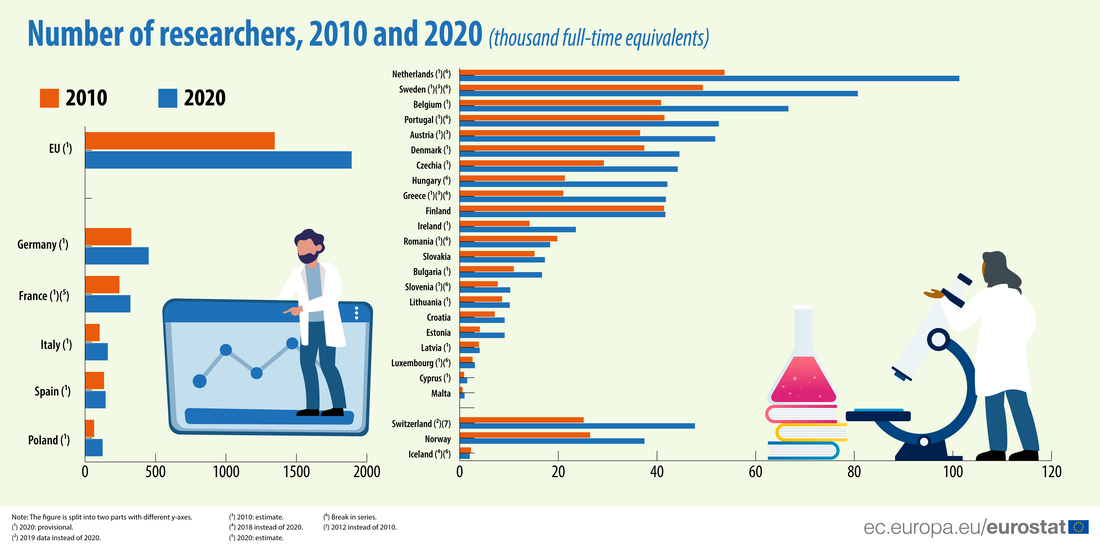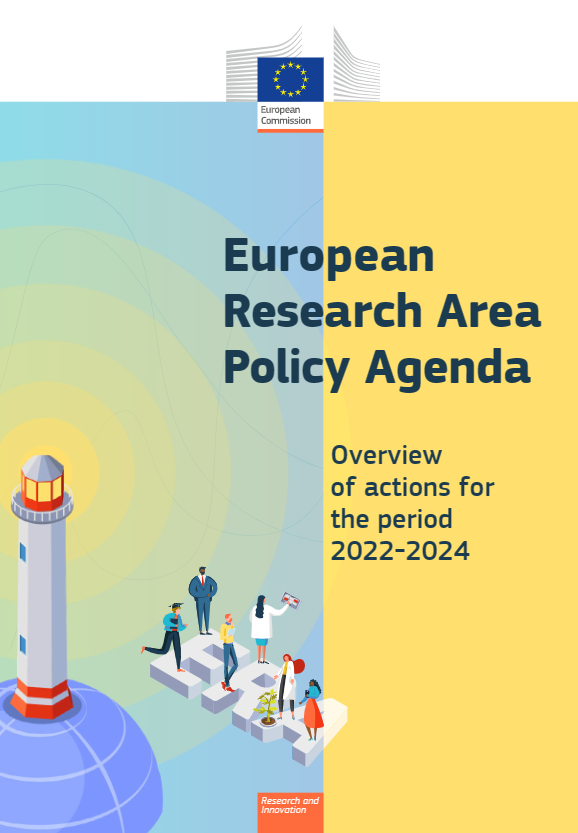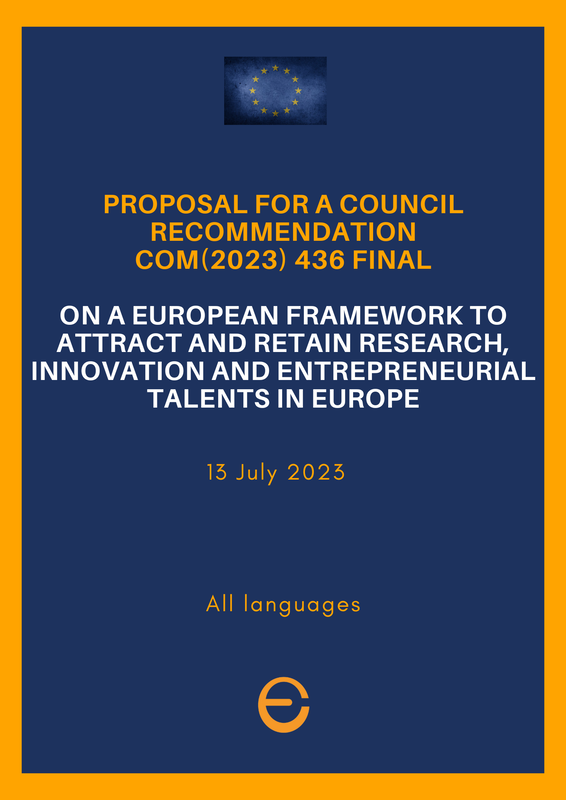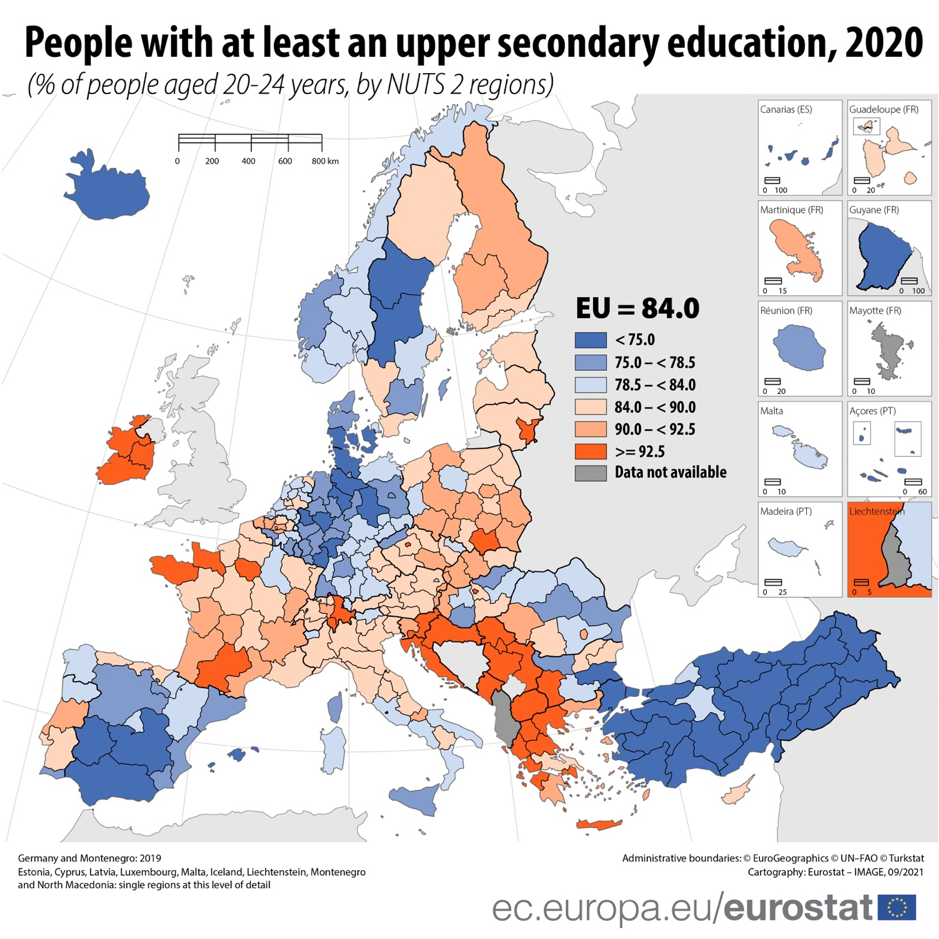|
Brussels, |
|
Europe Wants to Retain Researchers, Entrepreneurs, Inventors
New initiatives could bring substantial benefits to 2 million researchers across Europe by supporting stable and well-paid work opportunities.
Collectively, EU measures will benefit approximately 2 million researchers across Europe, paving the way for cutting-edge innovations and ensuring Europe's strength in vital sectors like health, defense, digital technologies, and green technologies. In this article, we will delve into the details of these transformative measures and their implications for research in Europe.
BY Claude MOREAU
Brussels, 23 October 2023 - 7 MINUTES READ
The European Commission has unveiled a comprehensive set of measures aimed at strengthening the European Research Area (ERA) and enhancing research careers across Europe. These measures are designed to make research careers more attractive, sustainable, and competitive, benefiting approximately 2 million researchers in the region. The primary objective is to promote and support stable, well-paid research opportunities, particularly for early-career researchers, while addressing career precariousness and positioning Europe as an appealing destination for international research talents.
In the European Union, the number of full-time equivalent (FTE) researchers has increased significantly in recent years, with 1.89 million researchers working in Member States in 2020, representing a gain of 546 thousand compared to 2010. The majority of researchers in the EU were employed in the business enterprise sector (55%) and the higher education sector (33%), with the government sector accounting for 11% of the total.
Notably, Greece and Hungary nearly doubled their number of researchers between 2010 and 2020, reaching 41,800 and 42,000 FTE researchers, respectively, in the past year. Poland also witnessed substantial growth, with 124,400 FTE researchers in 2020, an increase of 59,900 compared to 2010.
Several other EU countries experienced notable growth rates, including the Netherlands (89%), Malta (69%), Cyprus (67%), and Ireland (66%). The only exception was Romania, where the number of researchers in FTE declined by 7%. These findings highlight a positive trend in the expansion of the research workforce in the EU, with some countries making particularly significant strides, while others faced a decrease in their researcher numbers.
European countries retain their talents through various strategies and policies aimed at creating favorable conditions for the stay of researchers, entrepreneurs, inventors, and other prominent figures.
In the European Union, the number of full-time equivalent (FTE) researchers has increased significantly in recent years, with 1.89 million researchers working in Member States in 2020, representing a gain of 546 thousand compared to 2010. The majority of researchers in the EU were employed in the business enterprise sector (55%) and the higher education sector (33%), with the government sector accounting for 11% of the total.
Notably, Greece and Hungary nearly doubled their number of researchers between 2010 and 2020, reaching 41,800 and 42,000 FTE researchers, respectively, in the past year. Poland also witnessed substantial growth, with 124,400 FTE researchers in 2020, an increase of 59,900 compared to 2010.
Several other EU countries experienced notable growth rates, including the Netherlands (89%), Malta (69%), Cyprus (67%), and Ireland (66%). The only exception was Romania, where the number of researchers in FTE declined by 7%. These findings highlight a positive trend in the expansion of the research workforce in the EU, with some countries making particularly significant strides, while others faced a decrease in their researcher numbers.
European countries retain their talents through various strategies and policies aimed at creating favorable conditions for the stay of researchers, entrepreneurs, inventors, and other prominent figures.
Nonetheless, a unified european strategy is absent and available resources remain inadequate and poorly coordinated.
Some common methods should include:
Some common methods should include:
- Investments in Education and Research: European countries often invest in higher education and high-quality research to attract and retain talents. Prestigious universities, research centers of excellence, and attractive doctoral programs play a key role in this process.
- Employment Opportunities and Professional Growth: Providing interesting job opportunities and career growth paths is crucial for talent retention. This can include creating stimulating jobs, favorable working conditions, and skills development programs.
- Entrepreneurial Environment: Supporting innovation and entrepreneurship is essential for retaining entrepreneurs and inventors. This may include tax incentives, startup incubators, and access to funding.
- Quality of Life: Quality of life is an important retention factor. European countries often focus on high-quality public services, a safe environment, accessible healthcare, and a good work-life balance.
- Visa and Work Permit Programs: Simplifying visa and work permit processes for foreign talents can facilitate the stay of highly qualified individuals in Europe.
- Recognition of Skills: Ensuring that skills and qualifications are internationally recognized facilitates the mobility of talents within Europe.
- Professional Networks: Creating opportunities for individuals to establish professional networks and collaborate with other talents is essential for talent retention.
- Sustainability: Focusing on sustainability and environmental issues can be an attraction for talents who share these values.
The new EU measures to retain European researchers and entrepreneurs
Now, European countries seek to create a welcoming and supportive environment for talents, both domestic and international, to maximize their potential and promote innovation and development.
The key measures include:
- A New European Framework for Research Careers: The Commission has proposed a Council Recommendation that establishes a new European framework for research careers. This framework encompasses a wide range of aspects, such as defining researchers and research professions, improving recruitment and working conditions, fostering inter-sectoral and inter-disciplinary mobility, ensuring fair career development and progression, and supporting a balanced circulation of research talents. It also emphasizes effective monitoring of research careers through a dedicated observatory.
- A New Charter for Researchers: A new Charter for Researchers replaces the 2005 European Charter for Researchers and Code of Conduct for the Recruitment of Researchers. The updated charter outlines principles and requirements for researchers, employers, funders, and policymakers, with a streamlined structure. It will play a key role in enhancing research careers, fostering good working conditions for researchers at all career stages, and encouraging endorsement by research organizations across Europe.
- European Competence Framework for Researchers (ResearchComp): ResearchComp is the EU's first Competence Framework for Researchers, aligning with the European Year of Skills. It focuses on equipping researchers with transversal skills necessary for careers in various sectors, including academia, businesses, public administration, and start-ups. This framework supports the development of adapted doctoral training and targeted training opportunities, aiding researchers in identifying and improving their transversal skills.
|
These initiatives aim to strengthen the research and innovation system in Europe by enhancing research careers' attractiveness and effectiveness. By creating an environment that encourages research talents to stay in Europe and attracting international researchers, Europe can maintain its competitiveness in vital sectors such as health, defense, digital technologies, and green technologies. The European Commission's commitment to enhancing research careers and the research and innovation ecosystem extends beyond these measures. Upcoming initiatives include the ERA Talent Platform, an online hub for researchers, a Research and Innovation Careers Observatory to monitor the effects of these measures, and an investment strategy to support organizational changes that foster more attractive research careers. The Commission will also continue working on initiatives like EURAXESS, an ERA Talent Platform, RESAVER, and other tools to monitor and improve research and innovation careers. |
The Council Recommendation on attracting research, innovation and entrepreneurial talents in Europe
|
The proposed Council Recommendation is a response to the European Commission and the Council's concerns and recommendations, aiming to address the development of a European framework for research careers. The proposal sets standards for Member States, research organizations, funders, and stakeholders to enhance the stability and attractiveness of research careers. The primary goal is to retain European researchers and make Europe an appealing destination for foreign talents.
The proposal introduces a clear definition of 'researcher' to ensure proper recognition of the profession in Europe. Researchers can work in various research professions across sectors, including academia, business, public administration, and the non-profit sector. It also recognizes the diverse roles researchers and professionals play in research management, emphasizing the need for analysis and alignment of these professions at the European level. Improving working conditions, work-life balance, and addressing precarity are essential for enhancing research careers. This includes limiting fixed-term contracts, fostering sustainable funding mechanisms for research organizations, ensuring social protection, and portable pension rights. Early-career researchers receive particular focus with dedicated incentives. |
A new Charter for Researchers will replace the 2005 Charter and Code for Researchers, addressing researchers, employers, funders, and policymakers. It offers a streamlined set of principles to facilitate implementation across sectors and may initiate the revision of the current implementation mechanism, Human Resources Strategy for Researchers (HRS4R).
Enhancing researchers' skills, especially transversal skills using the European Competence Framework for Researchers (ResearchComp) and micro-credentials, encourages inter-sectoral mobility and knowledge circulation. This helps bridge the gap between researchers and the labor market's demand for highly skilled talents, fostering innovation.
Fostering entrepreneurial and innovative cultures, and supporting career advisory and development services, ensures researchers can contribute effectively and follow diverse career paths. The updated R1-R4 researcher profiles are complemented with occupation examples to make researchers' careers more comparable across sectors and countries.
The implementation of these standards and recommendations will strengthen national and European research and innovation systems and balance the circulation of talents. Support is provided for existing and new tools like EURAXESS, RESAVER, and ResearchComp through the ERA Talent Platform, a one-stop shop for researchers and research organizations.
A research careers observatory will monitor the proposal's implementation, collecting indicators to inform evidence-based actions at national and European levels. This comprehensive strategy aims to invigorate research careers and bolster Europe's competitive edge, promoting the flow of highly skilled and resilient talents across sectors and countries, ultimately driving innovation and societal progress.
Enhancing researchers' skills, especially transversal skills using the European Competence Framework for Researchers (ResearchComp) and micro-credentials, encourages inter-sectoral mobility and knowledge circulation. This helps bridge the gap between researchers and the labor market's demand for highly skilled talents, fostering innovation.
Fostering entrepreneurial and innovative cultures, and supporting career advisory and development services, ensures researchers can contribute effectively and follow diverse career paths. The updated R1-R4 researcher profiles are complemented with occupation examples to make researchers' careers more comparable across sectors and countries.
The implementation of these standards and recommendations will strengthen national and European research and innovation systems and balance the circulation of talents. Support is provided for existing and new tools like EURAXESS, RESAVER, and ResearchComp through the ERA Talent Platform, a one-stop shop for researchers and research organizations.
A research careers observatory will monitor the proposal's implementation, collecting indicators to inform evidence-based actions at national and European levels. This comprehensive strategy aims to invigorate research careers and bolster Europe's competitive edge, promoting the flow of highly skilled and resilient talents across sectors and countries, ultimately driving innovation and societal progress.
Conclusions
The proposal will be discussed by Member States for adoption, and the Commission will closely follow the implementation of these provisions. The comprehensive set of measures is the result of extensive consultations with Member States and stakeholders, reflecting a collective effort to strengthen the European research landscape and ensure that research careers are appealing, sustainable, and competitive in a global context.
© Copyright eEuropa Belgium 2020-2023
Source: © European Union, 1995-2023
Source: © European Union, 1995-2023




